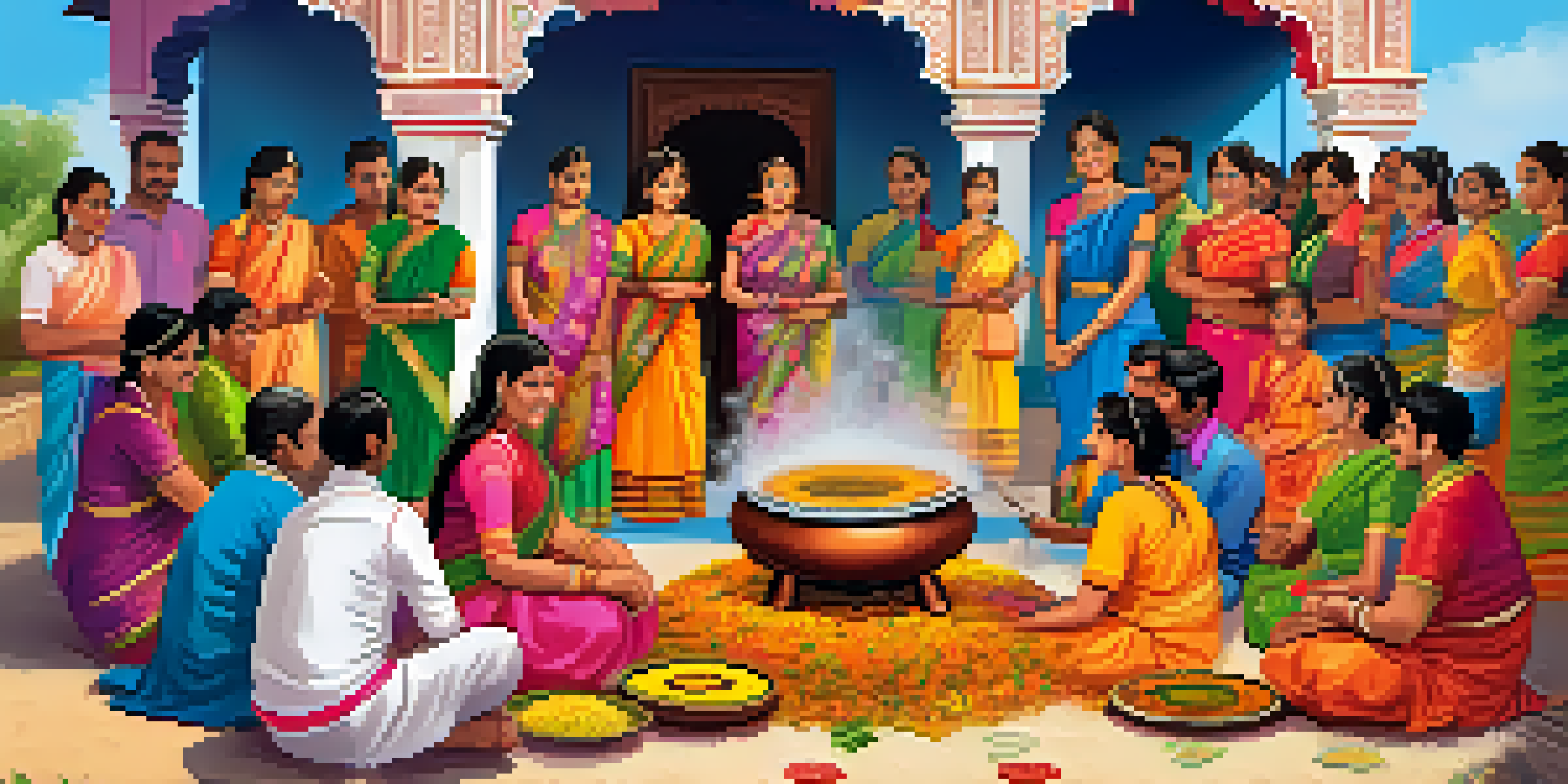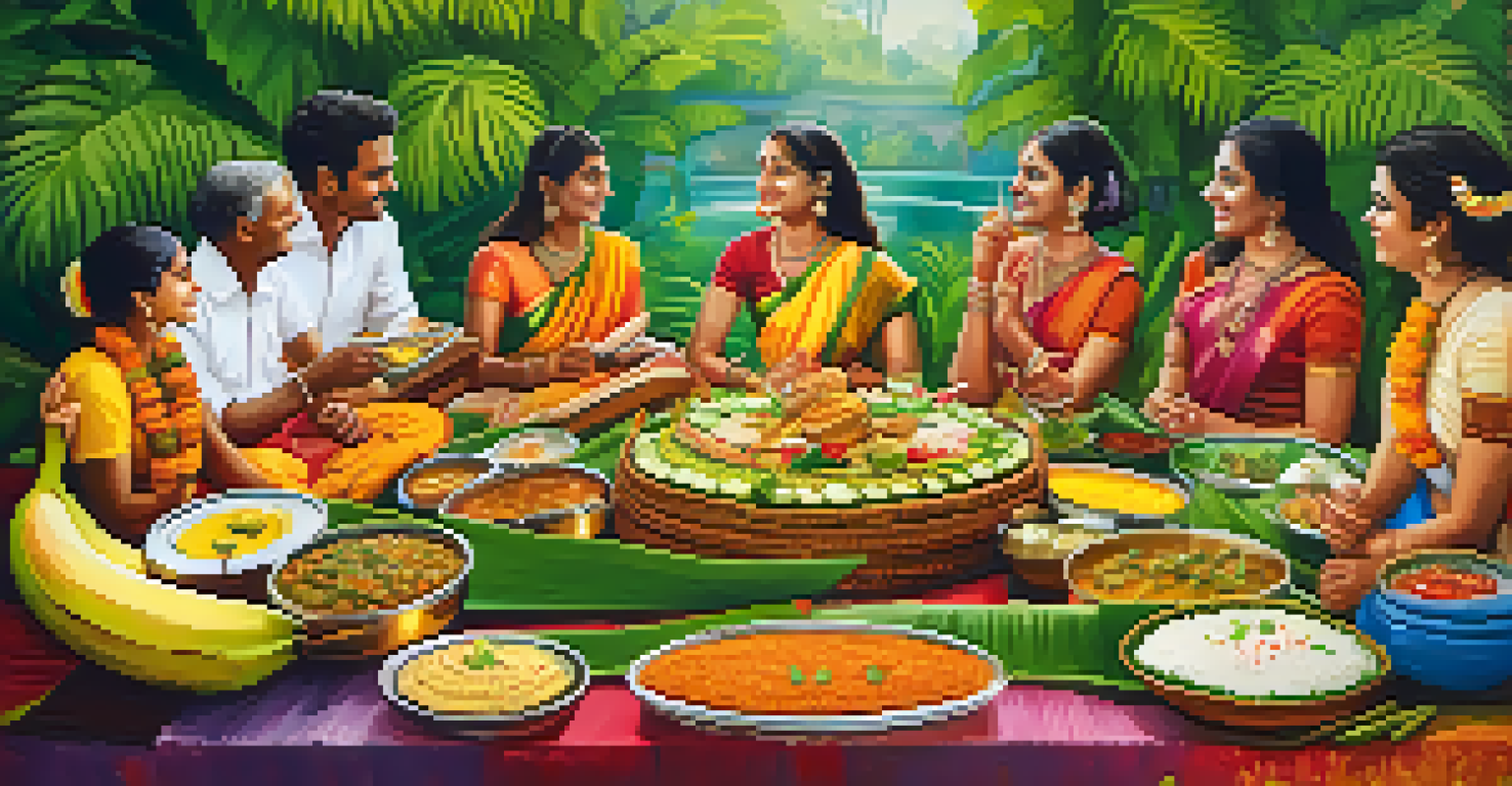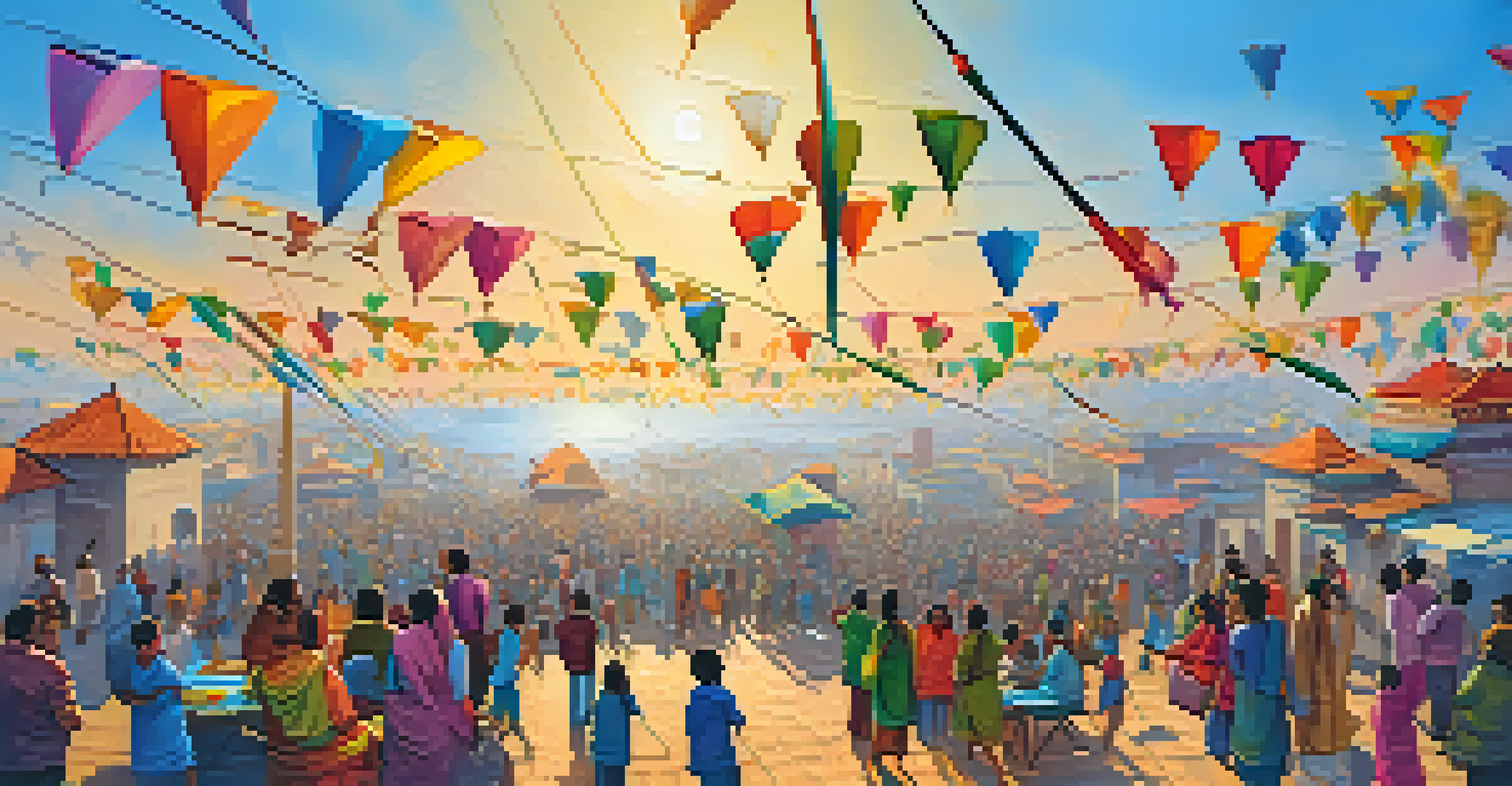The Rich Heritage of South Indian Festivals: A Cultural Overview

An Introduction to South Indian Festivals and Their Significance
South Indian festivals are a vibrant tapestry of culture, tradition, and spirituality. Each festival carries its own unique significance, often tied to local legends, seasonal changes, or agricultural cycles. This rich heritage reflects the diverse customs of the region, making every celebration a unique experience.
Festivals are the heartbeat of a culture, bringing together communities in celebration and reflection.
From the colorful lights of Diwali to the elaborate rituals of Pongal, these festivals showcase the deep-rooted values of family, community, and devotion. They serve as a reminder of the region's history and its connection to nature, fostering a sense of belonging among people.
As we explore the various festivals, we will uncover the stories behind them and the ways in which they bring communities together, reinforcing bonds and shared values that have been preserved through generations.
Pongal: A Celebration of Harvest and Gratitude
Pongal is one of the most important festivals in Tamil Nadu, celebrated to honor the harvest and express gratitude to nature. The festival spans four days, each dedicated to different deities and customs, with the highlight being the cooking of 'Pongal'—a sweet rice dish made from freshly harvested rice.

Families come together to prepare this dish outdoors, often under the sun, symbolizing warmth and togetherness. The celebration is marked by colorful kolams (rice flour designs) at entrances, traditional music, and dance, bringing the community alive with joy.
Vibrant Diversity of South Indian Festivals
South Indian festivals are a rich blend of culture, tradition, and spirituality, each uniquely tied to local legends and agricultural cycles.
Pongal is not just a feast; it’s a time for families to reconnect and express gratitude for the abundance of food. It beautifully encapsulates the essence of South Indian festivals—celebration, community, and reverence for nature.
Onam: The Grand Festival of Kerala
Onam is a grand harvest festival celebrated in Kerala, marking the homecoming of the legendary King Mahabali. This festival spans ten days and is characterized by various cultural events, including traditional boat races, flower arrangements, and dance performances like Thiruvathira and Pulikali.
Tradition is not the worship of ashes, but the preservation of fire.
The centerpiece of Onam is the sumptuous Onam Sadhya, a feast that consists of a variety of vegetarian dishes served on a banana leaf. This meal is a symbol of prosperity and unity, bringing families and friends together to enjoy the fruits of the harvest.
Onam also emphasizes the spirit of inclusivity, as people from different backgrounds come together to celebrate. This festival not only showcases Kerala's rich cultural heritage but also reinforces the values of harmony and shared joy.
Diwali: The Festival of Lights in South India
Though Diwali is widely recognized across India, its celebration in South India has unique customs and traditions. Known as Deepavali in the South, it symbolizes the victory of light over darkness and good over evil, celebrated with great enthusiasm.
Homes are adorned with colorful rangoli designs and lit oil lamps, creating a mesmerizing atmosphere. Families come together to perform Lakshmi Puja, seeking blessings for wealth and prosperity, and share sweets and snacks that add to the festive spirit.
Community and Togetherness in Celebrations
These festivals foster a strong sense of community and belonging, bringing families and friends together to celebrate shared values and gratitude.
The festival also fosters a sense of community, as neighbors exchange greetings and gifts. This shared joy is a testament to the enduring spirit of South Indian festivals, where the warmth of human connection shines brightly.
Navaratri: A Nine-Night Celebration of Divine Femininity
Navaratri is a nine-night festival dedicated to the worship of the Goddess Durga, showcasing the power of femininity and resilience. Each night is celebrated with specific rituals, dances, and music that pay homage to different forms of the goddess.
In South India, particularly in Tamil Nadu, the festival is marked by 'Golu'—a display of dolls and figurines that represent deities, stories, and cultural motifs. Families invite friends and neighbors to view their Golu, fostering a sense of community and shared celebration.
The vibrant dance forms, such as Garba and Dandiya, energize the nights, drawing people together in joyous celebration. Navaratri is not just a religious observance; it’s a vibrant cultural experience that celebrates the strength and grace of women.
Makar Sankranti: A Festival of Kites and Harvest
Makar Sankranti marks the transition of the sun into the zodiac sign of Capricorn, heralding the onset of longer days and the harvest season. Celebrated with enthusiasm in various South Indian states, this festival is synonymous with kite flying, making it a visual spectacle.
Families gather on rooftops, competing to fly kites and enjoy festive treats like tilgul—sweet treats made from sesame seeds and jaggery. This playful atmosphere fosters camaraderie and a spirit of friendly competition among neighbors and friends.
Cultural Significance of Harvest Festivals
Festivals like Pongal and Onam not only celebrate harvests but also emphasize themes of unity, prosperity, and respect for nature.
Makar Sankranti also holds agricultural significance, as it signals the end of the harvest season and the beginning of new sowing. The festival embodies the connection between nature and community, celebrating both agricultural prosperity and joyful togetherness.
Ugadi: The New Year Celebration in South India
Ugadi marks the beginning of the New Year for many South Indians, celebrated with great enthusiasm in states like Karnataka and Andhra Pradesh. The festival symbolizes new beginnings and is often associated with fresh starts, both spiritually and physically.
On this day, families prepare a special dish called 'Ugadi Pachadi,' which combines sweet, sour, and bitter flavors to signify the diverse experiences of life. This dish serves as a reminder that life is a blend of various emotions and experiences, making it truly rich.

Celebrating Ugadi involves various rituals, including the reading of the Panchanga (the Hindu calendar) to predict the coming year's fortunes. This festival beautifully encapsulates the hopes and aspirations of families, as they come together to embrace new opportunities and celebrate life.
Conclusion: The Enduring Legacy of South Indian Festivals
The rich heritage of South Indian festivals reflects the region's diverse culture, spirituality, and values. Each festival is a unique expression of community, tradition, and the deep-rooted connections between people and nature.
These celebrations not only bring joy and togetherness but also preserve age-old customs that have been passed down through generations. They remind us of the importance of unity, gratitude, and reverence for the world around us.
As we cherish these vibrant traditions and partake in the festivities, we contribute to the enduring legacy of South Indian culture, ensuring that these beautiful celebrations continue to thrive for future generations.